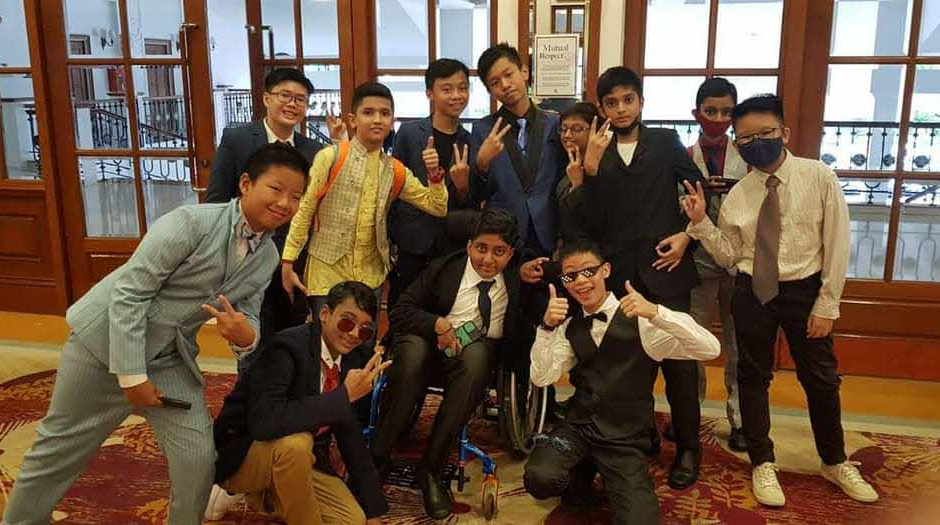Ask Rohin Anandth what the biggest highlight of primary school was and he would tell you that it was being elected head prefect.
It is a huge honour for any student, but even more significant for Rohin, who started school expecting to be treated differently because he was wheelchair-bound.
Living with distal arthrogryposis, a skeletal muscle disorder, means that Rohin does not have full range of movement in his hands and feet. However, being differently abled did not deter him from making the best of his years at Edgefield Primary School.
Now 13 and a Secondary 1 student, he looks back on his primary school years with fondness. “I felt not only accepted by my teachers and schoolmates but also appreciated for my contributions to the school.”
’My classmates found a way for me to play catch with them’
“When I first stepped into school in Primary 1, I was afraid that I would not be accepted for who I am, pitied or treated differently just because I was in a wheelchair,” says Rohin. These feelings quickly dissipated when his peers picked up the courage to approach him.
“They were very polite and not in any way offensive, which made it easier for me to overcome my shyness and share with them why I was in a wheelchair,” he says.
During recess, they would try their best to include him in their activities – for instance, playing catch.
“At first, we didn’t know what to do, but with a little trial and error, we figured out the perfect version of how we could play catch,” Rohin recounts. What was this perfect version? One of his friends would push him on his wheelchair and together as one, they would catch the others or be chased after.
It was these same classmates who would offer to fetch things from his schoolbag or to wheel him around, using the school’s lift to access the different facilities around school.
When it came to learning, Rohin’s teachers took into account his physical challenges. For instance, as he could not write for extended periods of time, his English language teacher allowed him to use a laptop to type out his compositions.
For Physical Education, when his classmates were tossing balls to improve their hand-eye coordination, his teacher would make modifications so Rohin could also take part, by say, using a racquet to hit a ball attached by rope to a pole.
Though he was often away from school for medical appointments, his teachers and classmates would help him catch up by updating him outside of class; “I would follow up with my own revision at home to bring myself up to speed”, he says.

Rohin back in 2017 toting his Edusave Merit Bursary Award for good academic results.
Safe environment for him to express himself
Rohin’s attributes his sense of curiosity and confidence to ask questions to the safe environment to speak up in school. “In class, we were all given opportunities to ask questions or to make suggestions,” he says. “I particularly enjoyed working in groups with different people in class. It allowed me to meet more people, work as a team and learn from their ideas as well.”
Rohin’s positive personality plays a part too.
He doesn’t feel shy to approach classmates if they looked a little down or needed a word of encouragement. In time, his teachers saw him playing the role of mediator with ease: He would listen to the group’s different perspectives and help them come to a consensus.
In Primary 3, they wanted to nurture his potential as a student leader and selected him to be a Friend of Singa (FOS) Ambassador. Rohin befriended his peers and encouraged them to have positive habits. In one project, he worked with his fellow ambassadors on keeping the canteen tables clean, not wasting food, and recycling.

Rohin speaking to his schoolmates about good habits during their recess.
The following year, he was made a prefect. His student leadership teachers mentored him, providing monthly training and check-ins so that he could grow in communication and leadership skills. “Rohin took on his role with responsibility, he never missed a single duty or mentoring session,” says Ms Parameswari, his student leadership teacher-mentor.
“My teachers were my role models. I observed how they assessed different situations and adjusted the way they responded to best manage them.” he explains. “They were engaging, funny, sometimes casual, and then serious when the situation called for it.

Rohin with his head prefect badge which he wore to school with pride every day.
A moment of reckoning came for Rohin in Primary 5, when elections for head prefect took place. It was a big step for the boy but he was ready.
He went through interviews with the student leadership teachers, was shortlisted as a candidate, then made a speech using an acronym of his name: Responsible, Optimistic, Hardworking, Innovative, Nice (ROHIN) to explain why he should be elected. He emerged the winner after a round of voting among his peers and the teaching staff.
“I felt really happy and appreciated when I found out that I would be head prefect,” he says. “My teachers and friends were able to see past my physical differences to how I have been contributing to the school.”
Rohin was fully committed to his role. He worked with his prefects during the COVID-19 pandemic to implement any changes required to keep the school safe, plan duties and initiatives to serve the school community, and guide the junior prefects too.

Rohin dreams of being a scientist in the future, figuring why things work the way they do.
A scientist solving the world’s problems one at a time
Now a student at St Joseph’s Institution, Rohin looks back at how his primary school experiences laid the foundation and trajectory for his career goals – he grew from the widespread support and leadership opportunities, and would like to see where his confidence and problem-solving skills will take him.
“I wanted to be a lawyer, because as you can see, I love to talk,” he says, laughing, “but now, I aspire to be a research scientist. I’m very keen to figure out how things work. Life intrigues me; I want to discover new solutions which will eventually help others.”
Reflecting further, he concludes that “being differently abled does not deprive me of my aspirations. I can’t change how I was born, but I am in control of my future”.






.jpg)